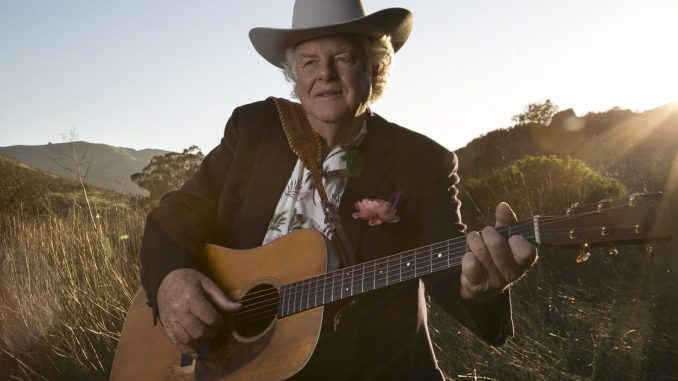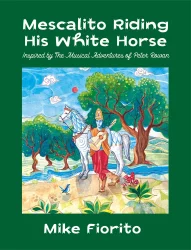
 A connection between bluegrass and Buddhism may not appear obvious. But fans of legendary bluegrass artist Peter Rowan will know they are inextricably bound. Since he was a teenager, author Mike Fiorito has loved bluegrass generally and Rowan in particular. He describes his latest book, ’Mescalito Riding His White Horse’ as “an unconventional mixture of interview, visions and memoir”. During several interviews with Rowan, starting over the phone then face to face, Fiorito delves into Rowan’s illustrious bluegrass career and his influences, such as Bill Monroe, with whom Rowan played. It comes as little surprise but the profound impact of Buddhism takes the conversation to a far deeper level. The book is a series of essays based around those interviews, interspersed with extracts from Buddhist teachings, Fiorito’s own experiences and his vivid dreams. At first, these sections feel barely related. But Rowan is fascinating, whether on Monroe or his beliefs, and Fiorito’s love for his subject is infectious. In a short book, any reader with an ounce of curiosity will enjoy, and be enlightened by, this unusual alliance. As those familiar with Rowan will recognise instantly, the title comes from a line in one of his most loved songs, ‘Free Mexican Airforce’ on his eponymous debut solo album. Several of the chapter headings follow a similar pattern, unsurprisingly most come from his ‘Dharma Blues’ record.
A connection between bluegrass and Buddhism may not appear obvious. But fans of legendary bluegrass artist Peter Rowan will know they are inextricably bound. Since he was a teenager, author Mike Fiorito has loved bluegrass generally and Rowan in particular. He describes his latest book, ’Mescalito Riding His White Horse’ as “an unconventional mixture of interview, visions and memoir”. During several interviews with Rowan, starting over the phone then face to face, Fiorito delves into Rowan’s illustrious bluegrass career and his influences, such as Bill Monroe, with whom Rowan played. It comes as little surprise but the profound impact of Buddhism takes the conversation to a far deeper level. The book is a series of essays based around those interviews, interspersed with extracts from Buddhist teachings, Fiorito’s own experiences and his vivid dreams. At first, these sections feel barely related. But Rowan is fascinating, whether on Monroe or his beliefs, and Fiorito’s love for his subject is infectious. In a short book, any reader with an ounce of curiosity will enjoy, and be enlightened by, this unusual alliance. As those familiar with Rowan will recognise instantly, the title comes from a line in one of his most loved songs, ‘Free Mexican Airforce’ on his eponymous debut solo album. Several of the chapter headings follow a similar pattern, unsurprisingly most come from his ‘Dharma Blues’ record.
Although Fiorito lucidly covers Rowan’s career, the book is not a biography. It goes much further. What began as an interview for a magazine article turned into a quest to seek how “music can connect us to a deeper spirituality”. This aim is set out in the first chapter, ’I Have Sung Illusion’s Songs’ from ‘Dharma Blues’. A mighty challenge, yet through this one person he introduces as “Not only a musician and a songwriter, Peter is also a poet, magus, mystic and mentor”, Fiorito is succesful. Rowan provides a multitude of insights through people, beliefs and experiences to show how music can mine a far deeper seam within us.
’The Musical Adventures of Peter Rowan’ is a more straightforward chapter starting with Fiorito’s own introduction to bluegrass growing up in Queens. He discovered the band Old & In The Way, consisting of guitarist Rowan, Jerry Garcia on banjo, fiddler Vassar Clement and mandolinist David Grisman that “launched me on a personal spiritual and musical journey to which I see no end”. Coming so soon in the book such conviction knocks the reader into shape for what is to come. And that seems to be Fiorito’s style. He says something that sounds rather over the top, but in substantiating his claim his candour and love come across as utterly genuine. After decades immersed in bluegrass and Rowan he finally gets an interview with the great man. Interestingly, Buddhism makes an early entry as that introduction to Rowan came via an interview he had done with Tibetan singer, Yungchen Lhamo, who had performed and recorded with Rowan. Fiorito’s anticipation is palpable as he wonders if his bluegrass knowledge will stand scrutiny. He need not have worried as Rowan puts him at his ease in a lively Q&A about how this boy from Wayland, Massachussetts, became one of Bill Monroe’s Bluegrass Boys in the early 1960s, got into west coast psychedelia with Grisman in Earth Opera (who often supported the Doors), then went solo with ‘Peter Rowan’ in 1978.
Rowan heeded Monroe’s advice, “Don’t ever give up Pete, don’t ever give up”. Whether it’s the finer points of bluegrass playing or singing or pursuing his own spirituality, Rowan’s curiosity and determination have remained undimmed ever since. Dominated initially by Monroe, Rowan’s reminiscences teem with musical greats. As well as the aforementioned Old & In The Way there is Joe Valiante, Tex Logan, Bill Keith, Jim Rooney, Ralph Rinzler, Porter Wagoner, Jack Casady and Gillian Welch. Musically, Rowan’s Buddhism surfaces most evidently only in 2014 with ‘Dharma Blues’, a collection that embraces rock, blues jazz and world. But throughout this discography, Rowan is a storyteller and if his music has an aim, he wants it to make people happy.
After that first chat, Fiorito wanted more and so followed further calls before, eventually, they met. Chapters dealing with his vision of the Dalai Lama and 7th Century Buddhism pave the way for his claim to have always known Rowan. “We’ve been crossing paths in the multiverse for billions of years”. And here is where a sceptical reviewer told himself just to suspend judgement and so the rest of the book made a great deal of sense. Not least when Fiorito revealed his own past, particularly as a twenty-something, living in the Bay Area reading Kerouac and attending The Empty Gate Meditation Center.
‘Mescalito Riding His White Horse’ reaches its own nirvana in the chapter, ‘Interview with Peter Rowan in Sausalito’. After jumping back and forth from bluegrass to Buddhism everything now falls perfectly into place as on meeting, Fiorito and Rowan immediately felt they had known each other all their lives. How Rowan became interested in Buddhism is engrossing. As young as five he loved exploring the natural world observing how the same piece of land changes so much with the seasons. Change is integral to how he sees things. His interests kept moving; from Thoreau to Hemingway and Kerouac, folk music, rock, jazz and bluegrass but throughout ran a link that bound his deepening Buddhist belief. A teacher told him, “it’s no mistake that you are here. This is from a previous connection”. To Rowan bluegrass is “transportive”, hard to play and due to its speed, hard to fully appreciate, but it is definitely spiritual. Music ”affects us on an emotional level like nothing else”. Birdsong synthesises into dreams then into ‘Dharma Blues’. If that sounds a bit mystic Rowan’s subsequent analysis of bluegrass playing styles illustrated by Monroe, Flatt and Scruggs is correspondingly practical.
Singing and clapping together as their chat draws to a close binds these two believers. More Buddhism, musical history with Harry Smith, compiler of ‘Anthology of American Folk Music’ and dreams fittingly brings Fiorito full circle to the book’s beginning and how he met Yungchen Lhamo.
There is much to enjoy about ‘Mescaline Riding His White Horse’ whether bluegrass generally, Peter Rowan or different philosophies. But whatever our beliefs, or none, being able to suspend judgement is a valuable gift. It is also the way to best appreciate this intriguing book. To close with Rowan, “It’s not the what of the what you think you think you’re thinking, it’s the when”. You might like to read that again.


